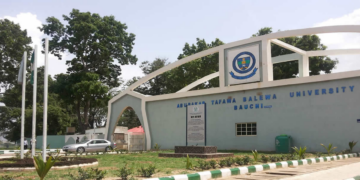Magaji Abdullahi Early Childhood Care, Development and Education (ECCDE) centre, Sokoto is a busy place to be on a typical morning during school hours.
The sight of kids aged 3-5 years moving round in circles, with a mixture of routines, traditions, music, movement, conversation, learning, and fun is behold to watch.
These activities, popularly known as ‘Morning Circle,” is a ritual, usually practiced in the morning when the children gather together to enjoy each others’ company and explore their own inner thoughts and emotions under the guidance of a teacher.
The whole class participates in a circle, which is led by the tutor.
When LEADERSHIP visited the ECCDE Centre, which is located at Shagari community, Shagari Local Government, Sokoto, during a fieldwork session, organised by the United Nations Children’s Fund (UNICEF), the pupils took turns in leading the circle while expressing pleasurable facial looks.
The travel time from Sokoto to Shagari Local government is about 40 minutes by car.
On arrival, the pupils are seated in a circle on the floor. Most of the time, they would stand in uniformity to match the activity in question with an action on the directive of a teacher.
Zara’u Modi is the instructor who leads the pupils in a song while they take up response with clapping of hands and body demonstration. They talk and listen to her as she unfolds another drama activity and a lot more.
Besides Modi is a 4 year old girl called Fatima Sani. She dances so elegantly while singing the song in Hausa language, led by her teacher.
Fatima enjoys every bit of the activity and could not wait to come back to school the following day. Even when the session elapsed she kept clapping and meditating on what she had learnt.
To her, the ritual encourages her to engage with friends and teachers in a positive way and also come to school every day.
“I’ve been taught how to read and write through practical demonstrations and I want to keep reading,” Fatima said in a few words when asked about the process.
However, LEADERSHIP gathered that morning circle is about more than just dancing and socialising; it usually follows a set structure that encourages every kid to get involved in learning through more playful methods.
Circle time is one of the things young children look forward to at school. It is a time for important social interactions among young children which helps them develop positive relationships between other kids through engaging and fun activities.
It was also gathered that preschool circle time activities keep kids occupied while helping the transition from one part of the day to the next. Circle time is usually light and fun and has the goal of getting children ready for learning.
Unlike Magaji Abdullahi ECCDE Centre, the need for all preschools and early childhood development centers to adopt morning circle strategy to help children develop the social and communication skills that will eventually usher them into adulthood cannot be overemphasised.
Given that pre primary education is a key strategy for improving learning and education outcomes as well as efficiency of education systems, there’s need to ensure that the value of play for children’s development and learning is widely understood and enacted in pre primary sub-sector plans and policies, says experts.
But amid the success story comes the Challenges. One of the biggest obstacles has been lack of instructional materials in teaching the kids and hunger.
Modi said the school is impacting knowledge to the kids through morning circles and also identified lack of water as another challenge as there was no borehole in the school.
“In 2003 I started teaching here and we have been having training which helped me impact on the children. From the training I learnt that there is a need to prepare the children to play so as to make them understand whatever they’re being taught. When they play they perform better.
“Every day what we are supposed to teach them in class, we would already do it outside through play method.”
“We also don’t have a safe place to keep the little instructional materials that we have. But despite the shortage of instructional materials, we are using available tools to carry out the teaching. We are using stones and other natural tools to apply to the teaching,” she said.
However, Farouk Umar, the director of Early Child Care Development, SUBEB, Sokoto said the state is looking towards addressing some of the challenges of early childhood education.
“The issue of school feeding is done in some schools and there’s a gradual process of doing it to cover the whole state.
“I’m sure we will continue to expand until all the schools are covered. We were supposed to be here just after 9am because usually they release them for a break around 9am. That’s why if you look at the children now most of them are very hungry, they want to go home because they’re used to going home by this time.
“There’s a need for orientation so that parents and community members are fully informed on the importance of education and in fact, that’s why we have a plan for Basic education in the state.
“In the last two weeks we have been doing training for five days where we review the plan and we incorporated a lot of sensitization activities under the ECCDE to ensure that more awareness is created in ECCDE centres,” he said.
Meanwhile, UNICEF Education Specialist Yetunde Oluwatosin said the first five years of a child’s life is actually a critical period for them because it is a time for them to develop their Social, cognitive, emotional and of course physical development.
She noted that the experiences a child goes through at this time has a major impact in their future
“So now we are talking about play-based learning. You find out that when a child is able to play within his or her environment, within the things that are available and within playing with their peers and also looking at adults as well, they’re able to develop all these areas and as they grow in life you see that these domains in them are very well developed.
“We have heard in the past years especially after COVID that there is a global learning crisis and if we must be honest with ourselves, if we look back at the foundational level we find out that is actually the root cause if we are looking at the root cause of this global learning crisis because children who are not in either Early Childhood education or pre primary education automatically they are lacking in some skills and they’re being left behind.
“For us in Nigeria, the 2018 National Personnel Audit that UBEC did finds out that there are over N7m of our children within that age range for pre primary education. So looking at the population of the age group in Nigeria you find out that just 1 out 3 children is attending early childhood or organized learning so what happens to the rest of the children?”





